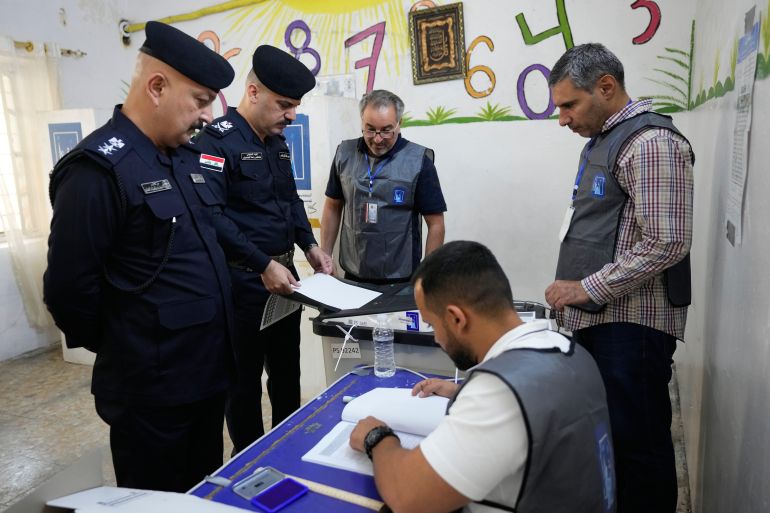Special voting for forces and displaced in Iraq parliamentary polls begins
Nearly 1.3 million members of the security forces and more than 26,500 internally displaced people are eligible to vote ahead of Tuesday’s polls.

By Mariamne Everett and News Agencies
Published On 9 Nov 20259 Nov 2025
Save
Members of Iraq’s security forces and its internally displaced population have begun casting their ballots in the parliamentary elections – the sixth since a United States-led invasion toppled longtime ruler Saddam Hussein in 2003.
Polls opened at 7am (04:00 GMT) on Sunday for 1.3 million members of the security forces at 809 polling centres and will close at 6pm (15:00 GMT) before they are deployed for security purposes on the election day on Tuesday.
Recommended Stories
list of 4 itemsend of list
More than 26,500 internally displaced people are also eligible for early voting on Sunday across 97 polling stations at 27 places in Iraq, the Iraqi News Agency (INA) said.
Interior Minister Abdul Amir al-Shammari told INA that the special voting process is advancing “smoothly and in an organised manner”.
Nearly 21 million Iraqis are eligible to vote on Tuesday across 4,501 polling stations nationwide, the INA said.
More than 7,750 candidates, nearly a third of them women, are running for the 329-seat parliament. Under the law, 25 percent of the seats are reserved for women, while nine are allocated for religious minorities.
The current parliament began its term on January 9, 2022, and will last four years, ending on January 8, 2026.
An old electoral law, revived in 2023, will apply to the ongoing elections, with many seeing it as favouring larger parties. While about 70 independents won in the 2021 vote, only 75 independents are contesting this year.
Observers also fear that turnout might dip below the record low of 41 percent in 2021, reflecting voters’ apathy and scepticism in a country marked by entrenched leadership and allegations of mismanagement and endemic corruption.
Advertisement
There were widespread accusations of corruption and vote-buying before the elections, and 848 candidates were disqualified by election officials, sometimes for obscure reasons, including insulting religious rituals or members of the armed forces.
Past elections in Iraq have been marred by violence, including assassinations of candidates, attacks on polling stations, and clashes between the supporters of different blocs. While overall levels of violence have subsided, a candidate was assassinated in the run-up to this year’s election.
Influential Shia leader Moqtada Sadr urged his followers to boycott what he described as a “flawed election”.
Al-Sadr’s bloc won the largest number of seats in 2021, but later withdrew after failed negotiations over forming the government amid a standoff with rival Shia parties. He has since boycotted the political system.
Prime Minister Mohammed Shia al-Sudani, elected in 2022 with the backing of pro-Iran parties, is seeking a second term and is expected to secure a sizeable bloc.
Among the other frontrunners are influential Shia figures, including former Prime Minister Nouri al-Maliki and Muslim scholar Ammar al-Hakim.
By convention in post-invasion Iraq, a Shia Muslim holds the powerful post of the prime minister and a Sunni of the parliament’s speaker, while the largely ceremonial presidency goes to a Kurd.

